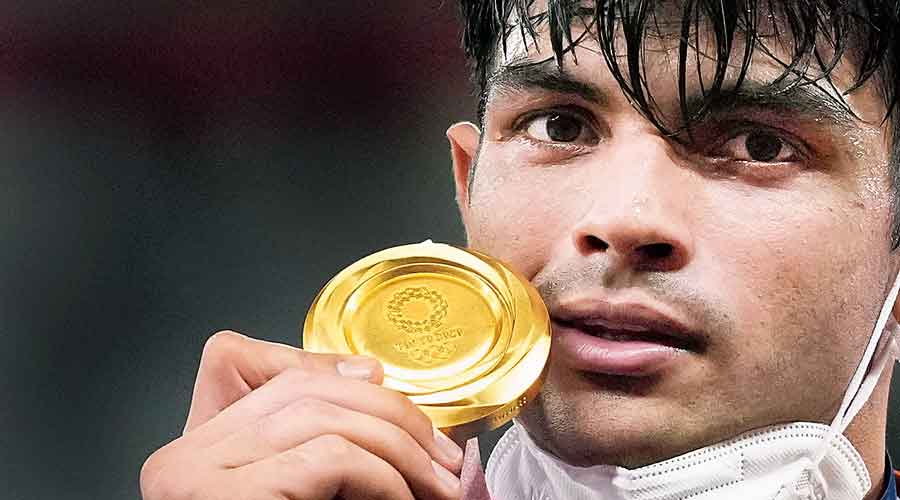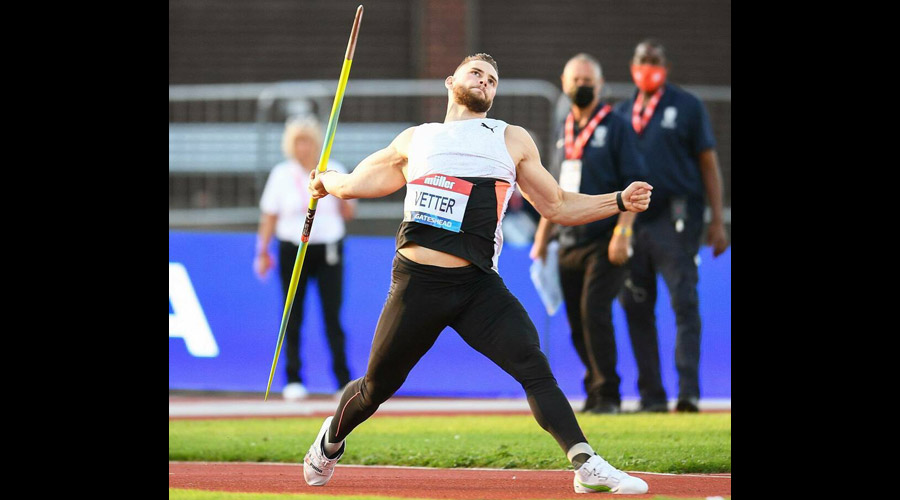White bandana holding back his unruly mop, Neeraj Chopra sprinted in and hurled his javelin. He immediately turned his back on the action, raised his arms and punched the air.
The javelin was still airborne but the 23-year-old didn’t need to look. He seemed to know the throw was good enough. And it was.
At 87.58 metres, the young Haryanvi from Panipat had already assured himself a gold — India’s first medal in Olympic athletics since Independence and its
second individual Games gold — with just the second of his six permissible throws.
India had had a few near-misses over the years. P.T. Usha got beaten to bronze by a hundredth of a second in the 400m hurdles at Los Angeles 1984.
And then there was the recently deceased Milkha Singh — the man Neeraj dedicated his gold to — who had missed bronze by a tenth of a second in the 400m in Rome 1960.
But Neeraj’s story has been a rare one in Indian sport: of early promise fulfilled in a most emphatic way.
If that early celebration carried shades of Usain Bolt from Beijing 2008, the swagger with which the Olympic debutant went about his job was an eye-opener for a nation obsessed with cricket.
On Saturday at Tokyo’s Olympic Stadium Neeraj had faced a stellar field, led by the favourite Johannes Vetter, a 28-year-old German who has thrown the javelin to 90-plus distances seven times between April and June this year.
But the Indian rookie seemed to psyche all of them out with throws of 87.03m and 87.58m on his first two attempts, and nobody thereafter got close. Once silver-medallist Czech Jakub Vadlejch’s last throw was declared a foul, the Indian had the gold in the bag.
“Unbelievable feeling. It’s the first time India has won a gold in athletics, so I feel very good. We have just one gold here in other sports,” Neeraj said.
Neeraj said his strategy was to give it everything at the outset to gain the psychological advantage over his rivals.
“I knew that if I could get a good throw, that would put some pressure on the rest. Hence, it was very important that I got a good first throw. It came good and it was over 87 metres.”
He dedicated the medal — which comes 13 years after shooter Abhinav Bindra gave India its first individual gold in Beijing — to Milkha, leaving his golfer son Jeev Milkha Singh “crying”.
“Milkha Singh wanted to hear the national anthem in a stadium. He is no longer with us but his dream has been fulfilled,” Neeraj said.
“Dad waited so many years for this to happen. His dream has finally come true with India’s first athletic gold. I am crying as I tweet this. And I am sure dad is crying up above. Thank you for making this happen,” Jeev posted on social media.
Vetter, who finished a shock ninth, had ribbed his close friend Neeraj last month, telling a news conference: “Neeraj is good but can’t beat me.”
On Saturday, Vetter rose above his personal disappointment to say he was happy for his Indian chum, who had been seen egging him on as the German got ready for his second throw.
“He is a really talented guy, always really friendly. I am happy for him,” said Vetter, who had in 2018 predicted that Neeraj would be a global star and throw 90m-plus in the near future.
Neeraj had on Wednesday qualified for the final with a throw of 86.65m, which put him on top of the list. “So I knew I could do better in the final; I didn’t know it would be gold,” he said.
“His is a story of dedication, discipline and hard work. A down to earth and simple guy,” Vijay Sharma, the coach of weightlifter and Tokyo silver medallist Mirabai Chanu, told The Telegraph.
Neeraj has helped make this India’s best ever Olympic Games, with seven medals in all, including two silver and four bronze, the last of them delivered by wrestler Bajrang Punia.
This beats the previous haul of six medals in London 2012 that did not include any gold.













